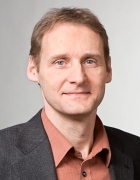
Prof. Dr.-Ing. Andreas Kremling
Academic Career and Research Areas
Prof. Kremling (b. 1965) explores the theoretical and experimental aspects of biotechnology processes. He particularly aim at developing and analyzing meaningful mathematical models for optimal process design. In the focus are bacterial systems like Escherichia coli, Pseudomonas putida and Halomonas elongata. In a new project, he investigates mixed cultures with phototroph and heterotroph bacteria that produce bio-plastic.
After studying technical cybernetics in Stuttgart, he did his doctorate there in 2002. He completed his lecturer qualification at the University of Magdeburg in 2009. In 1998, he had commenced his research activities in systems biology at the Max Planck Institute for Dynamics of Complex Technical Systems in Magdeburg. In 2010, he was appointed as an associate professor of system biotechnology at TUM.
Key Publications (all publications)
Kratzl, F., Kremling, A., and Pflueger-Grau, K. Streamlining of a synthetic co-culture towards an individually controllable one-pot process for polyhydroxyalkanoate production from light and CO2. Engineering in Life Sciences 23, 2023.
AbstractDoan, D.T., Hoang, M.D., Heins, A.L., Kremling, A. Applications of Coarse-Grained Models in Metabolic Engineering. Frontiers in Molecular Biosciences 9, 2022.
AbstractLoewe, H. und Kremling, A. In-Depth Computational Analysis of Natural and Artificial Carbon Fixation Pathways. Bio Design Research, Vol 2021, 2021.
AbstractKremling, A. A counting-strategy together with a spatial structured model describes RNA polymerase and ribosome availability in Escherichia coli. Metab. Eng. 67, 2021.
AbstractLoewe, H., Sinner, P., Kremling, A., Pflueger-Grau, K. Engineering sucrose metabolism in Pseudomonas putida highlights the importance of porins. Microbial Biotechnology 13, 2020.
AbstractIf you wish your profile to be changed or updated please contact Franz Langer.